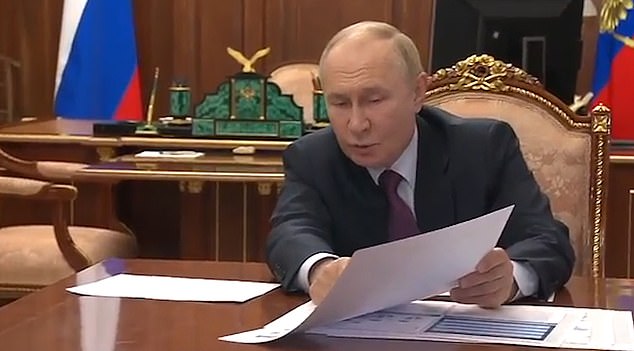This is the moment one of his top energy officials takes down the cocky Vladimir Putin in a row during a tense discussion over Russia’s Arctic infrastructure projects.
The General Director of the Russian state atomic energy corporation Rosatom, Alexei Likhachev, visited the Kremlin yesterday, where he gave a presentation on the company’s performance and ongoing projects under Vladimir’s iron gaze.
After a long speech in which he boasted about Rosatom’s 24 percent annual revenue growth and praised the successes of the company’s work to establish Russia as a major player in global nuclear energy, CEO shared a map of Russia’s Arctic region to discuss development. of the Northern Sea Route and transport networks.
Putin dismissed Likhachev’s work and immediately intervened, declaring with a smile: ‘The Northern Latitudinal Railway project is missing from his presentation. It is necessary to show it.”
But the energy chief calmly pointed out that the railway lines were clearly indicated and told the Kremlin chief: ‘The Northern Latitudinal Railway 1 runs from Nadym to Obskaya, and the Northern Latitudinal Railway 2 continues from Obskaya to Sabetta.’
‘The two sections are shown here by a short dashed line.’
Putin was visibly confused and tilted his head to check the map before realizing he had made a mistake.
He later backtracked and ordered Likhachev to highlight the lines, even as the official noted that budget constraints had restricted construction plans.
Putin dismissed Likhachev’s work and declared with a smile: ‘The Northern Latitudinal Railway project is missing from his presentation. It is necessary to show it’
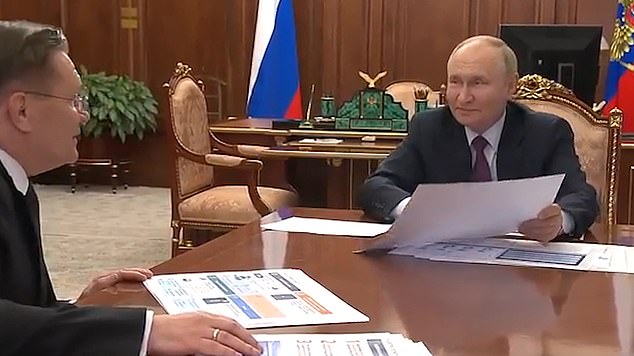
Putin is seen flashing a smug smile at Likhachev, but the official quickly put him off and pointed out his mistake.
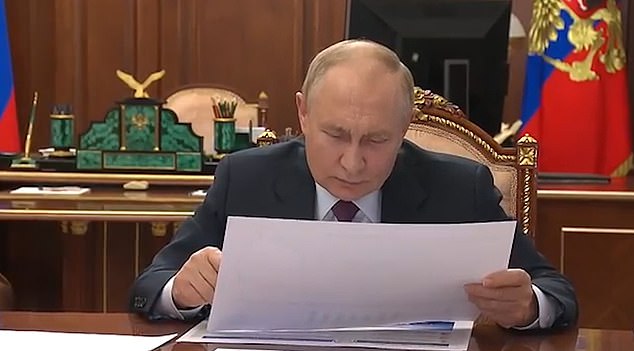
Putin was visibly confused and tilted his head to check the map before realizing he had made a mistake.
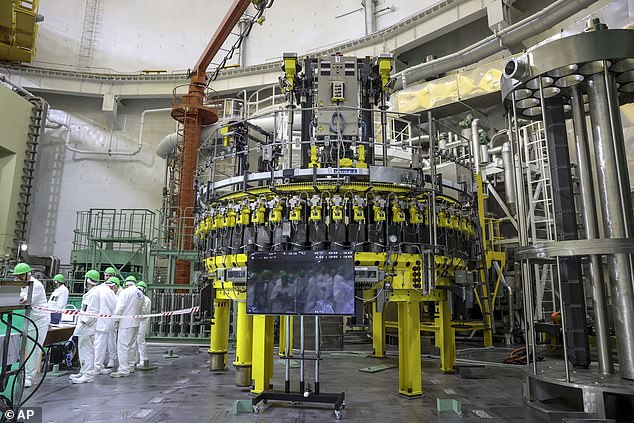
In this Friday, Aug. 7, 2020, file photo, staff work to begin loading nuclear fuel at Belarus’ first nuclear plant, built by Russian state nuclear corporation Rosatom, near Astravets, Belarus.
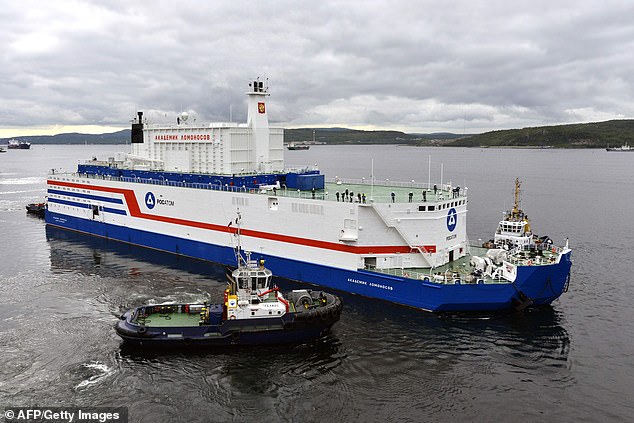
This photo taken and released on August 23, 2019 by the Russian nuclear agency ROSATOM shows the Akademik Lomonosov floating power unit (FPU) being towed from the Arctic port of Murmansk in northwestern Russia.
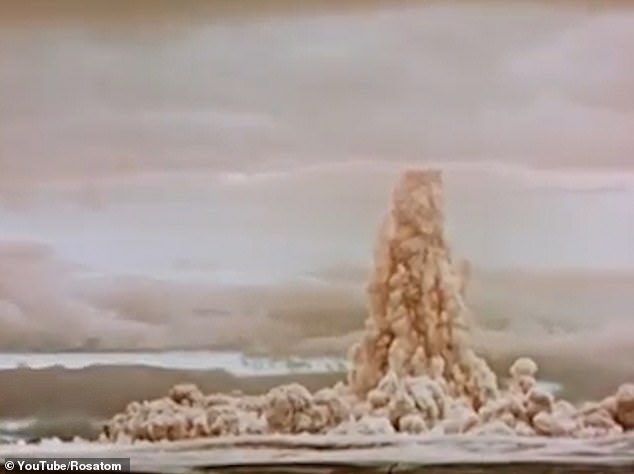
Rosatom oversees the maintenance, modernization and development of Russia’s fearsome nuclear arsenal
Apart from that misunderstanding that seemed to worry the Russian President, Likhachev’s presentation was well received.
Rosatom is a gigantic corporation that is responsible not only for Russia’s domestic and international nuclear energy programs, but also for a number of infrastructure projects along with technology and defense manufacturing.
It is also, of course, the organization that oversees the maintenance, modernization and development of Russia’s fearsome nuclear arsenal.
Likhachev explained how, despite the pressure of Western sanctions, the ongoing war in Ukraine and turbulent economic conditions, Rosatom was enjoying growing internal and external revenues and had also achieved a considerable return on its investments.
The official stressed that the state corporation now employs a staggering workforce of more than 400,000 people in Russia and is on track to meet Putin’s demand that 25 percent of the country’s electricity must be derived from nuclear power by 2040.
Rosatom has also solidified its position as a major player in nuclear exports and is largely responsible for the success of Russia’s energy diplomacy, a cornerstone of Moscow’s foreign policy strategy that cultivates the Kremlin’s influence around the world.
Likhachev highlighted the successful commissioning of a nuclear power plant in Belarus as a notable recent achievement.
But he also mentioned a number of countries where Rosatom has managed to obtain lucrative long-term contracts to build and maintain new plants, or to supply nuclear fuel to existing ones.
Some of the nations that have reached an agreement with Rosatom include NATO members Turkey, China, India, Iran and Egypt.
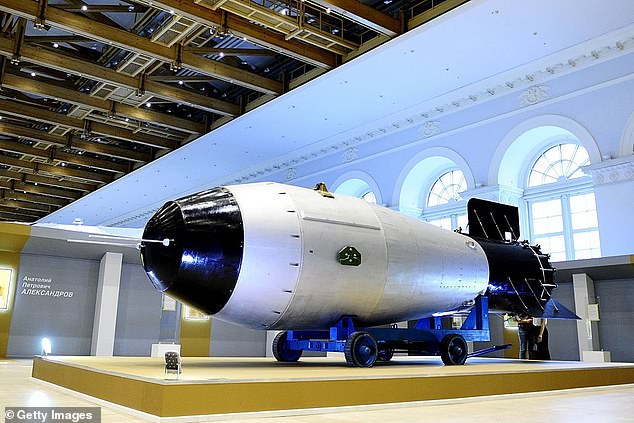
Soviet hydrogen bomb AN-602 during an exhibition organized by the Rosatom agency in Moscow, Russia
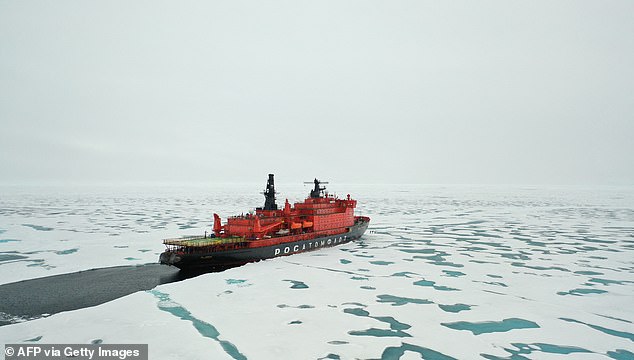
The Russian nuclear-powered icebreaker ’50 Years of Victory’ built by Rosatom is seen at the North Pole on August 18, 2021.
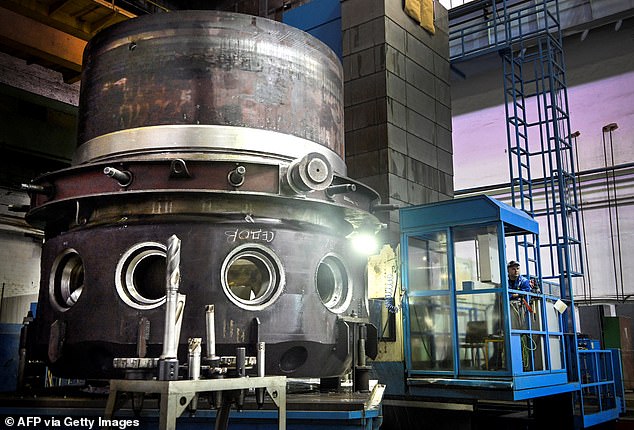
An image shows the manufacturing of a RITM-200 nuclear reactor, the latest reactor for the icebreaker fleet, at the ZiO-Podolsk machine-building plant, a company of the Rosatom machine-building unit of the Russian nuclear agency, in the city of Podolsk in Moscow. region on December 5, 2023
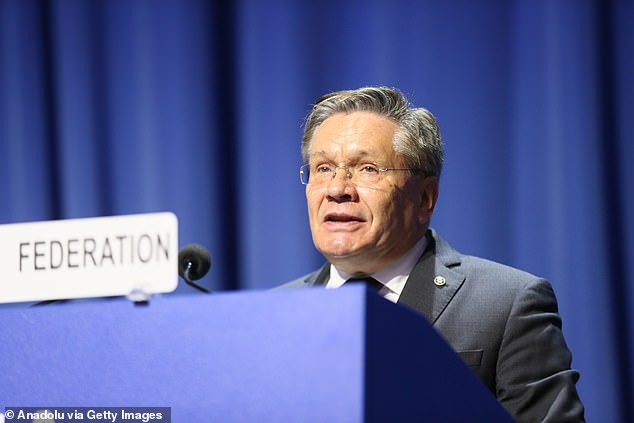
President of the Russian State Nuclear Energy Corporation Rosatom Alexey Likhachev delivers a speech during the 68th General Conference of the International Atomic Energy Agency (IAEA) in Vienna, Austria, September 16, 2024.
As the meeting came to a close, Likhachev expressed gratitude for Putin’s continued support for Rosatom and said the company would press ahead with its ambitious plans before reaching a major milestone next year.
The year 2025 marks the 80th anniversary of the launch of the Soviet Union’s nuclear power industry in 1945, in the waning moments of World War II.
Less than a decade later, the Soviet Union commissioned the world’s first nuclear power plant, the Obninsk Nuclear Power Plant, in June 1954.
The official even earned some praise from the Russian president, who approved Likhachev’s request to hold a series of events in August and September to mark the 80th anniversary and agreed to take part in the celebration.
“Mr. President, next year we will celebrate 80 years of the nuclear industry… we certainly invite you and we want it to be a festive day not only for the employees of the nuclear industry but also for the entire country and for all our partners. abroad,” said Likhachev.
“Very well, of course,” Putin responded.
‘Eighty years… but the future is good.’


